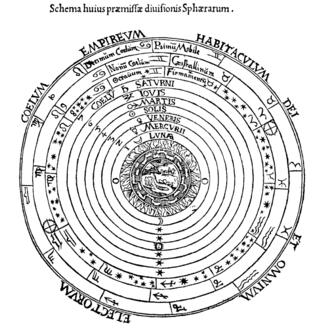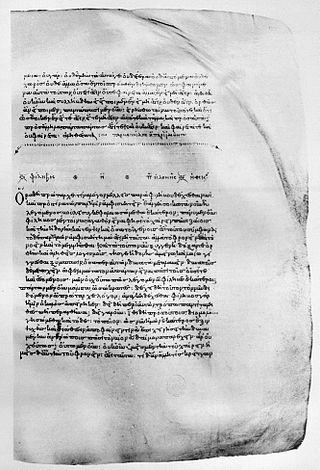
Hans-Georg Gadamer was a German philosopher of the continental tradition, best known for his 1960 magnum opus on hermeneutics, Truth and Method.

Plato, born Aristocles, was an ancient Greek philosopher of the Classical period who is considered a foundational thinker in Western philosophy and an innovator of the written dialogue and dialectic forms. He raised problems for what became all the major areas of both theoretical philosophy and practical philosophy, and was the founder of the Platonic Academy, a philosophical school in Athens where Plato taught the doctrines that would later become known as Platonism.
Ancient Greek philosophy arose in the 6th century BC. Philosophy was used to make sense of the world using reason. It dealt with a wide variety of subjects, including astronomy, epistemology, mathematics, political philosophy, ethics, metaphysics, ontology, logic, biology, rhetoric and aesthetics. Greek philosophy continued throughout the Hellenistic period and later evolved into Roman philosophy.
Platonic love is a type of love in which sexual desire or romantic features are nonexistent or have been suppressed, sublimated, or purgated, but it means more than simple friendship.

Aristotelianism is a philosophical tradition inspired by the work of Aristotle, usually characterized by deductive logic and an analytic inductive method in the study of natural philosophy and metaphysics. It covers the treatment of the social sciences under a system of natural law. It answers why-questions by a scheme of four causes, including purpose or teleology, and emphasizes virtue ethics. Aristotle and his school wrote tractates on physics, biology, metaphysics, logic, ethics, aesthetics, poetry, theatre, music, rhetoric, psychology, linguistics, economics, politics, and government. Any school of thought that takes one of Aristotle's distinctive positions as its starting point can be considered "Aristotelian" in the widest sense. This means that different Aristotelian theories may not have much in common as far as their actual content is concerned besides their shared reference to Aristotle.
The Form of the Good, or more literally translated "the Idea of the Good", is a concept in the philosophy of Plato. In Plato's Theory of Forms, in which Forms are defined as perfect, eternal, and changeless concepts existing outside space and time, the Form of the Good is the mysterious highest Form and the source of all the other Forms. It is a Platonic ideal.
Christianity and Hellenistic philosophies experienced complex interactions during the first to the fourth centuries.
Summum bonum is a Latin expression meaning the highest or ultimate good, which was introduced by the Roman philosopher Cicero to denote the fundamental principle on which some system of ethics is based — that is, the aim of actions, which, if consistently pursued, will lead to the best possible life. Since Cicero, the expression has acquired a secondary meaning as the essence or ultimate metaphysical principle of Goodness itself, or what Plato called the Form of the Good. These two meanings do not necessarily coincide. For example, Epicurean and Cyrenaic philosophers claimed that the 'good life' consistently aimed for pleasure, without suggesting that pleasure constituted the meaning or essence of Goodness outside the ethical sphere. In De finibus, Cicero explains and compares the ethical systems of several schools of Greek philosophy, including Stoicism, Epicureanism, Aristotelianism and Platonism, based on how each defines the ethical summum bonum differently.
Middle Platonism is the modern name given to a stage in the development of Platonic philosophy, lasting from about 90 BC – when Antiochus of Ascalon rejected the scepticism of the new Academy – until the development of neoplatonism under Plotinus in the 3rd century. Middle Platonism absorbed many doctrines from the rival Peripatetic and Stoic schools. The pre-eminent philosopher in this period, Plutarch, defended the freedom of the will and the immortality of the soul. He sought to show that God, in creating the world, had transformed matter, as the receptacle of evil, into the divine soul of the world, where it continued to operate as the source of all evil. God is a transcendent being, who operates through divine intermediaries, which are the gods and daemons of popular religion. Numenius of Apamea combined Platonism with neopythagoreanism and other eastern philosophies, in a move which would prefigure the development of neoplatonism.

Platonism is the philosophy of Plato and philosophical systems closely derived from it, though contemporary Platonists do not necessarily accept all doctrines of Plato. Platonism has had a profound effect on Western thought. At the most fundamental level, Platonism affirms the existence of abstract objects, which are asserted to exist in a third realm distinct from both the sensible external world and from the internal world of consciousness, and is the opposite of nominalism. This can apply to properties, types, propositions, meanings, numbers, sets, truth values, and so on. Philosophers who affirm the existence of abstract objects are sometimes called Platonists; those who deny their existence are sometimes called nominalists. The terms "Platonism" and "nominalism" also have established senses in the history of philosophy. They denote positions that have little to do with the modern notion of an abstract object.
Olympiodorus the Younger was a Neoplatonist philosopher, astrologer and teacher who lived in the early years of the Byzantine Empire, after Justinian's Decree of 529 AD which closed Plato's Academy in Athens and other pagan schools. Olympiodorus was the last pagan to maintain the Platonist tradition in Alexandria ; after his death the School passed into the hands of Christian Aristotelians, and was eventually moved to Constantinople. He is not to be confused with Olympiodorus the Deacon, a contemporary Alexandrian writer of Bible commentaries.

Nous, from Greek: νοῦς, is a concept from classical philosophy, sometimes equated to intellect or intelligence, for the faculty of the human mind necessary for understanding what is true or real.

The Philebus is a work by the ancient Greek philosopher Plato, written in dialogue form. It presents a fictional conversation between Plato's teacher Socrates and two young Athenians, Philebus and Protarchus. The main topic is the ethical evaluation of pleasure.
Atticus was an ancient Platonic philosopher who lived in the second century of the Christian era, under the emperor Marcus Aurelius. His lifetime fell into the epoch of Middle Platonism, of which he was one of the most notable representatives.
Substantial form is a central philosophical concept in Aristotelianism and, afterwards, in Scholasticism. The form is the idea, existent or embodied in a being, that completes or actualizes the potentiality latent in the matter composing the being itself. For Aristotle, in fact, matter is the basis of all that exists; it comprises the potentiality of everything, but of itself is not actually anything. A determinate thing only comes into being when the potentiality in matter is converted into actuality; this is achieved by the substantial form. It is substantial because it is the principle by which a material kind of thing is recognised as such.
Common sense is "knowledge, judgement, and taste which is more or less universal and which is held more or less without reflection or argument". As such, it is often considered to represent the basic level of sound practical judgement or knowledge of basic facts that any adult human being ought to possess. It is "common" in the sense of being shared by nearly all people. The everyday understanding of common sense is ultimately derived from historical philosophical discussions. Relevant terms from other languages used in such discussions include Latin sensus communis, Ancient Greek κοινὴ αἴσθησις, and French bon sens. However, these are not straightforward translations in all contexts, and in English different shades of meaning have developed. In philosophical and scientific contexts, since the Age of Enlightenment the term "common sense" has been used for rhetorical effect both approvingly and disapprovingly. On the one hand it has been a standard for good taste, good sense, and source of scientific and logical axioms. On the other hand it has been equated to conventional wisdom, vulgar prejudice, and superstition.
Commentaries on Plato refers to the great mass of literature produced, especially in the ancient and medieval world, to explain and clarify the works of Plato. Many Platonist philosophers in the centuries following Plato sought to clarify and summarise his thoughts, but it was during the Roman era, that the Neoplatonists, in particular, wrote many commentaries on individual dialogues of Plato, many of which survive to the present day.
Neoplatonism is a version of Platonic philosophy that emerged in the 3rd century AD against the background of Hellenistic philosophy and religion. The term does not encapsulate a set of ideas as much as a series of thinkers. Among the common ideas it maintains is monism, the doctrine that all of reality can be derived from a single principle, "the One".
In philosophy and specifically metaphysics, the theory of Forms, theory of Ideas, Platonic idealism, or Platonic realism is a theory widely credited to the Classical Greek philosopher Plato. The theory suggests that the physical world is not as real or true as "Forms". According to this theory, Forms—conventionally capitalized and also commonly translated as "Ideas"—are the non-physical, timeless, absolute, and unchangeable essences of all things, of which objects and matter in the physical world are merely imitations. Plato speaks of these entities only through the characters in his dialogues who sometimes suggest that these Forms are the only objects of study that can provide knowledge.
Dionysius is a scholarly journal published by the Department of Classics at Dalhousie University. It was established originally in 1977, and a new series began in 1998. It publishes articles on the history of ancient philosophy and theology, and has a special interest in the Aristotelian and Neoplatonic traditions. It also publishes more general articles relating to literature, history, and religion.






